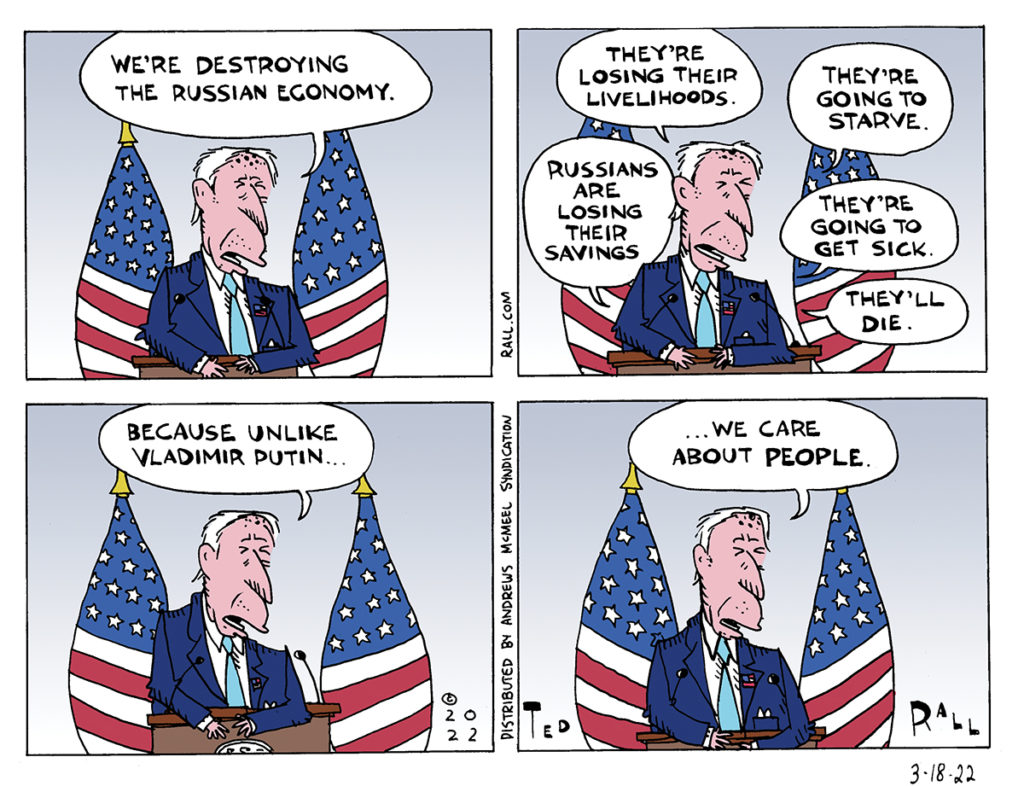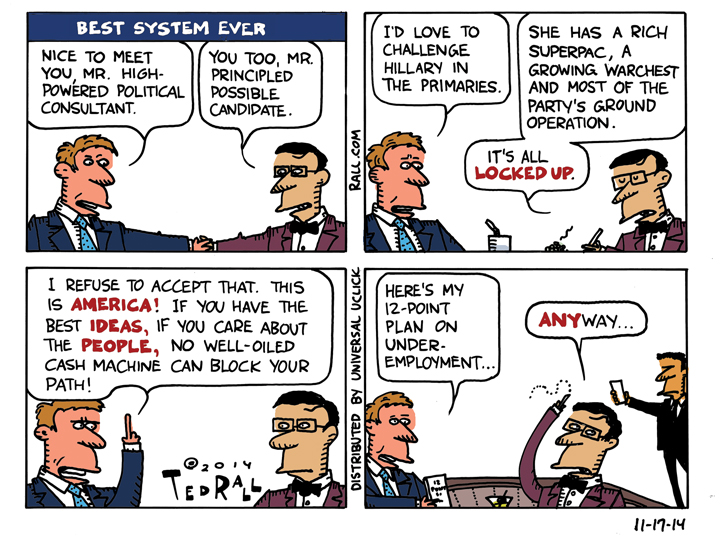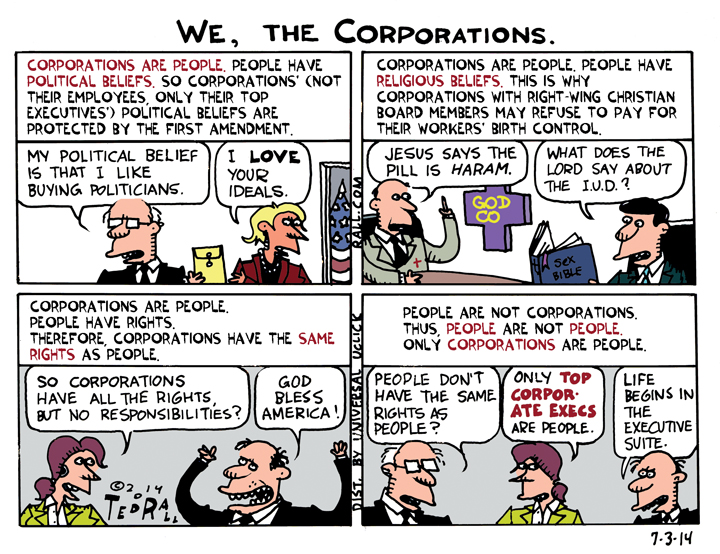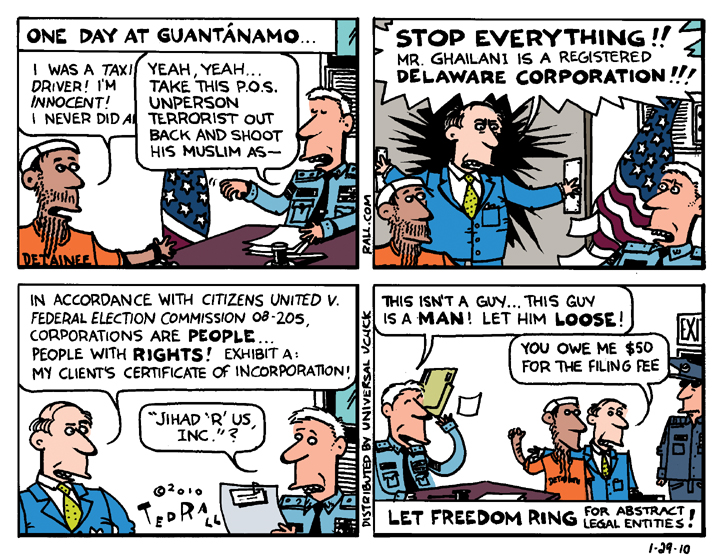American politicians and television viewers have been deeply moved by images of the suffering people of Ukraine. Unfortunately, the main response has been to impose brutal sanctions on Russia that will destroy the Russian people but not their leaders, who are well insulated from the effect of sanctions. If humanitarianism is the point here, what about the people, the human beings, of Russia?
We, the Corporations
The US Supreme Court has expanded the “corporate personhood” ruling in Citizens United, which expanded individual First Amendment rights to corporations that are established in order to evade personal liability, to allowing them to express their religious beliefs (actually the beliefs of their top executives) via, among other things, what health care benefits they’re willing to provide.
SYNDICATED COLUMN: WikiLeaks: The Devils We Know
Cables Reveal Background of Pro-Dictator U.S. Policy
After the Soviet collapse in 1991 U.S. policy toward Central Asia was transparently cynical: support the dictators, screw the people.
As the U.S. stood by and watched, corrupt autocrats looted the former Soviet republics of Turkmenistan, Uzbekistan, Kazakhstan and Tajikistan. Dissidents were jailed, massacred—even boiled.
Well, actually, the U.S. was anything but passive. They negotiated deals for oil and gas pipelines. They rented airbases after 9/11. They poured in tens of millions of American tax dollars—all of which wound up in secret bank accounts belonging to the dictators and their families. Meanwhile, average citizens lived in abject poverty.
During trips to Central Asia the locals constantly ask me: “Why doesn’t America stop supporting [insert name of corrupt dictator here] so we can kill him and free ourselves?”
Poor, naïve people. They believe our rhetoric. They think we like democracy. Actually, we’re all about the looting. Dictators are easier to deal with than parliaments. One handshake and a kickback, that’s all you need with a dictator.
Central Asia only had one democratically elected president, Askar Akayev of Kyrgyzstan. George W. Bush ordered the CIA to depose him in a coup.
Americans who care about human rights have long wondered: Is the State Department stupid and/or naïve? Or did the diplomats in Tashkent and other capitals of unspeakable misery understand the brutal and vile nature of Central Asia’s authoritarian leaders?
An examination of the WikiLeaks data dump answers that question: Yes.
Hell yes.
Like those from concerning more prominent countries, the WikiLeaks cables on the Central Asian republics can be funny. President Gurbanguly Berdimuhamedov, a U.S. “ally in the war on terror” who seized power in a palace coup following the death of Saparmurat “Turkmenbashi” Niyazov, is described as “the ‘decider’ for the state of Turkmenistan.” This is true. Turkmenistan is an absolute dictatorship in which millions starve while Berdimuhamedov’s inner circle feasts on the profits from the world’s largest reserves of natural gas.
A December 2009 cable describes America’s pet autocrat as “vain, suspicious, guarded, strict, very conservative, a practiced liar, ‘a good actor,’ and vindictive.”
According to an unnamed source, the outwardly conservative dictator has a Russian mistress named Marina, with whom he has a 14-year-old daughter. Though Berdy’s power may be limitless, his intellect is not. “Berdimuhamedov does not like people who are smarter than he is,” says the cable. “Since he’s not a very bright guy, our source offered, he is suspicious of a lot of people.”
No one’s perfect. Least of all America’s allies in Central Asia.
On the other side of the steppe in Kazakhstan, President Nursultan Nazarbayev presides over the world’s largest oil reserves with an iron fist. Among his greatest hits: the convenient “suicides” of his top two political opponents a few months before a presidential “election.” The two men apparently shot themselves in the back of the head, then bound their own hands behind their backs and dropped into a ditch outside Almaty.
Needless to say, Nazarbayev is another valuable U.S. ally in the war on terror.
But that doesn’t stop American gossip. Nazarbayev’s defense minister, says an embassy staffer in Astana, “appears to enjoy loosening up in the tried and true ‘homo sovieticus’ style—i.e., drinking oneself into a stupor.” But alcoholism isn’t illegal. Graft is—and the president is public enemy number one.
“In 2007, President Nazarbayev’s son-in-law, Timur Kulibayev, celebrated his 41st birthday in grand style,” explains an April 2008 cable. “At a small venue in Almaty, he hosted a private concert with some of Russia’s biggest pop stars. The headliner, however, was Elton John, to whom he reportedly paid one million pounds for this one-time appearance.” How did he come up with all that coin? “Timur Kulibayev is currently the favored presidential son-in-law, on the Forbes 500 list of billionaires (as is his wife separately), and the ultimate controller of 90% of the economy of Kazakhstan,” states a January 2010 missive.
Membership has its privileges. The U.S. has never spoken out against corruption or human rights abuses in Kazakhstan.
So it’s clear: American diplomats have no illusions about their brutal allies. Interestingly, Central Asia’s overlords have a dismally accurate view of corruption in the U.S. government.
“Listen, almost everyone at the top [of the Kazakh regime] is confused,” First Vice President Maksat Idenov told the U.S. ambassador to Kazakhstan early this year. “They’re confused by the corrupt excesses of capitalism. ‘If Goldman Sachs executives can make $50 million a year and then run America’s economy in Washington, what’s so different about what we do?’ they ask.”
No response was provided.
(Ted Rall is the author of “The Anti-American Manifesto.” His website is tedrall.com.)
COPYRIGHT 2010 TED RALL




